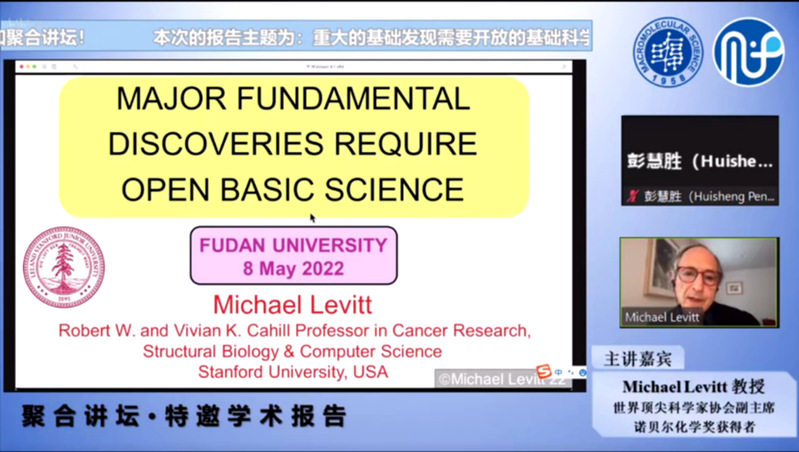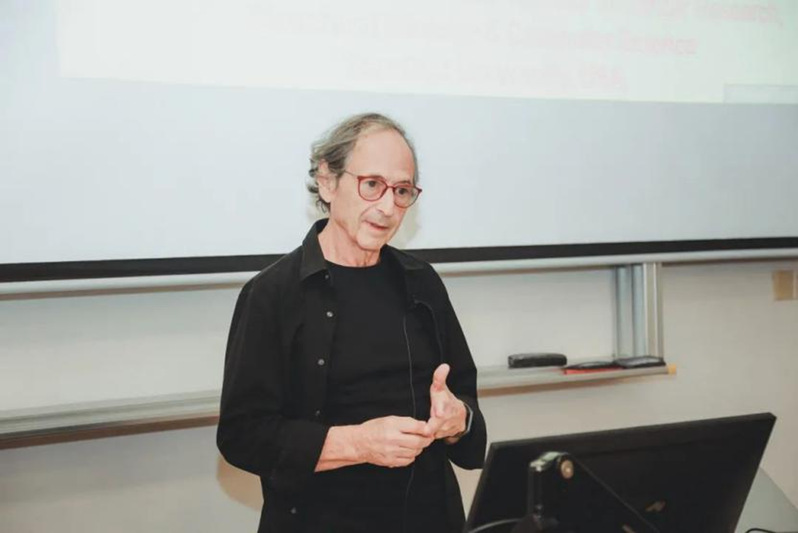As one of the early pioneers in the field of protein structure prediction, Michael Levitt has been active in the field for more than half a century. Recently, his protein structure prediction group, led by Professor Jianpeng Ma from Fudan University, China and Baylor College of Medicine, U.S., has worked hard to overcome various difficulties and has successfully discovered new methods to improve the efficiency of protein side chain modelling and expand drug design capabilities. During pandemic Michael Levitt conducted online courses for the students.
In 2018, Michael Levitt travelled across the ocean to Shanghai, China. In spite of the lanaguage barriers, Michael Levitt still felt at home here.
In the years that followed, Michael Levitt brought his advanced research and teaching ideas on simulated biological systems, protein and DNA molecules to his Chinese collabrators and students through one-on-one mentoring and general education courses for undergraduates, while training a group of high caliber of researchers.
On 8th May 2022, the Department of Macromolecular Science, Fudan University and Multiscale Research Institute for Complex Systems at Fudan University jointly organized the ninth series of invited lectures at the Macromolecular Forum, and Michael Levitt was invited to give a talk titled ‘Major Fundamental Discoveries Require Open Basic Science’. Over thousands of people attended the virtual event.

Michael Levitt indicated that although his research has contributed to antibody design and drug development, he would prefer to contribute more to basic science. Focused on basic research in his entire life, Michael Levitt believes that basic research should be about new discoveries that are unpredictable and unexpected, and he urges everyone to actively try scientific ideas that may seem crazy but can lead to major breakthroughs.
Michael Levitt said that you do not know if an area of basic research will contribute to practical applications, and researchers should not be discouraged from setting limits on seemingly unproductive basic research. It is important to plan scientific research, but planning without a change can be a drag. Discoveries in basic research are like buying lottery - you can not plan or predict, but if you buy more tickets, you are more likely to make world-class scientific discoveries. He hopes more young people will follow the path of research, and that different teams will collaborate on research across different platforms, making science more open and accessible, with no restrictions on discipline.

Medical Research Council (MRC) Laboratory of Molecular Biology (LMB) in Cambridge, U.K., where Michael Levitt studied and conducted research for many years, has generated multiple Nobel Laureates. Michael Levitt believes that the secret of this laboratory's success lies not only in its funding and administration system, but also in its small-group - about five researchers per group. The peer pressure enables everyone is more motivated and wants to do better. At the same time, it is important to follow the right mentor.
Michael Levitt is not only a strong advocate for basic science, but also values applied sciences and partnerships with industries. He believed such partnership would further stimulate his research interests and practical applications are one of his strengths. He also indicated that it is not easy to run a business, and research institutions and industries need to respect each other and work hand-in-hand, and students could learn a lot about industry during their internships at enterprises. He believes in the potential of Chinese companies with creativity and imagination.
Michael serves as a core member of the SIAS strategic development committee. ( SIAS- Shanghai Institute for Advanced Study of Zhejiang University).
This article was first published at: https://news.fudan.edu.cn/2022/0626/c5a131741/page.htm

